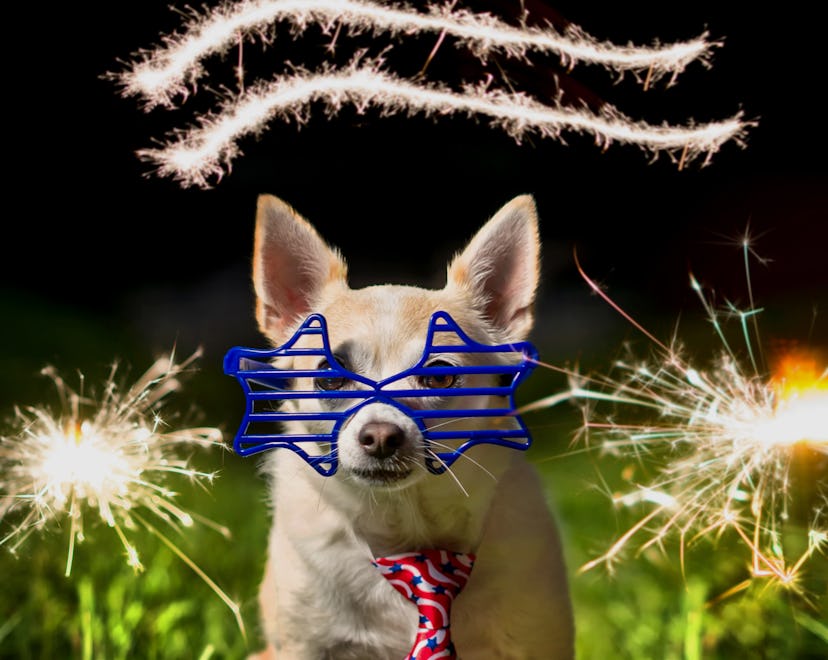Pets

What Can I Give My Dog For Fireworks Anxiety?
Try these vet-recommended remedies.
The thrill of fireworks on the 4th of July is a classic American pastime, but for dogs it might be more of a nightmare. Loud noises, violent flashes of light, and a whole lot of hootin’ and hollerin’ may sound like a good time to your family, but could set off all kinds of anxiety in your pup. So what’s a pet owner to do? Plenty. Dr. Marcus Dela Cruz, DVM, a veterinarian at Pismo Beach Veterinary Clinic, says there are lots of things you can give to your dog to manage its anxiety on the 4th of July.
But first you might be asking, why go to the trouble to give a dog an anxiety-reducer? Consider that “animal control officials across the country report a 30% increase in lost pets each year between July 4th and 6th,” according to PetAmberAlert. That’s a scary statistic and one pet owners can’t ignore as the Independence holiday approaches. Especially when you consider that 19 percent of the time loud noises are what causes pets to vanish, the ASPCA reports.
Is there a way to enjoy the fireworks displays and protect your pet? Or at the very least keep them calm throughout the evening displays? Dr. Dela Cruz and Dr. Danielle Debrincat, emergency veterinarian at the Veterinary Emergency Group in Denver, have some some suggestions.
Make a Safe Space
Both Dr. Dela Cruz and Dr. Debrincat recommends using drug-free tactics first to calm an anxious dog. That means creating a safe space in your home for your dog. Make it as comfortable as possible with blankets or a crate where your pup can retreat too when things get too noisy.
Consider a Thunder Shirt
Perhaps you’ve seen these before. Basically, a dog thunder shirts “provide deep pressure therapy by making the dog feel wrapped up and secure during a situation that causes panic or anxiety,” says Dr. Debrincat.
Drown Out the Noise
“It’s not possible to totally drown out the noise of fireworks, but you can help your dog feel a little more relaxed by covering up the sound with other household noises as much as possible,” says Dr. Debrincat. That could be playing soft music, turning up the volume on the TV or even using a white noise machine to distract from noisy fireworks.
Try a Pheromone Spray
Dr. Dela Cruz writes on his blog, The Friendly Vet, that Feliway for cats and Adaptil for dogs are pheromone sprays that can help. “These sprays are meant to mimic natural pheromones emitted by pets to send messages of happiness and harmony, helping pets feel comfortable and secure,” Dr. Dela Cruz says.
Consider An Herbal Relaxant
If you prefer herbal remedies, Dr. Dela Cruz says VetriScience makes an herbal relaxant called Composure for Dogs and Composure for Cats adding, “This chewable is made with Thiamine (Vitamin B1) and L-Theanine to promote a calm behavior in pets that are anxious. It has been shown to work within 30 minutes and can last up to 4 hours.” Just enough time to let your dog chill while the rockets red glare.
Treat with Melatonin
A hormone used for sleep management, melatonin is commonly used by people to fall asleep at night. But Dr. Dela Cruz says that when guided by a veterinarian, it can also be given to dogs to help relax them. That said, Dr. Dela Cruz adds that “Melatonin can decrease the effectiveness of other drugs that the dog may be on. I want to be clear when I say that melatonin is not to be used long-term for dogs with anxiety. When it comes to anxiety, melatonin is meant to be used in the short term while a better long term therapy can be established.”
You might be wondering about CBD products. Due to legal issues, there has yet to be much funding into research on how CBD can help pets, Dr. Dela Cruz says. “CBD was not used as nor is it meant to be a sole therapy for these pets. To my knowledge, there are no studies that have proven or suggest that CBD helps with anxiety,” he says.
The good news is, if none of the above remedies help your anxious dog, vets are always there to help find an alternative means of relief. Now is the time to consult your vet and come up with a plan to help your dog deal with its fireworks anxiety before the holiday arrives.
Experts sourced:
Dr. Marcus Dela Cruz, veterinarian, Pismo Beach Veterinary Clinic
Dr.Danielle Debrincat, emergency veterinarian, Veterinary Emergency Group
This article was originally published on